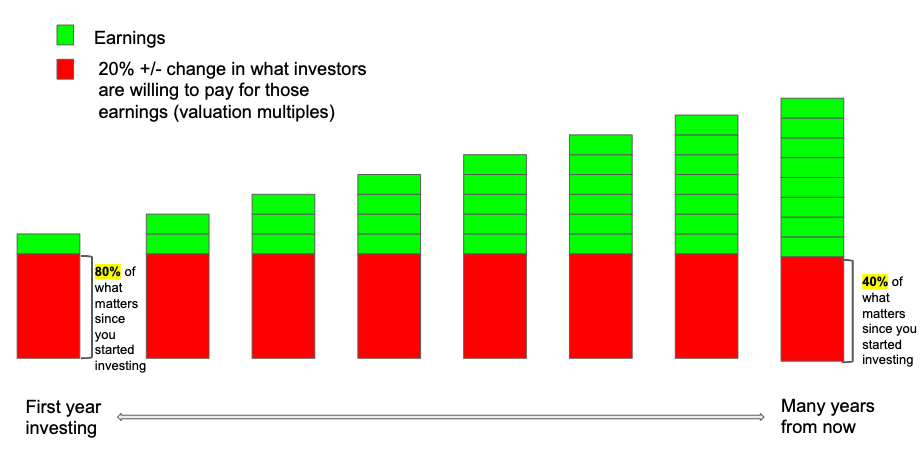Why Time Horizon Works
Ben Graham said, “In the short run the market is a voting machine but in the long run it’s a weighing machine.”
This is true for stock markets, job markets, campaigns, relationships. “I’ll accept whatever answers you have today, but in the future you have to show your work” is how a lot of things function.
Here’s why it’s so powerful in investment markets.
Two things drive markets over time:
-
Earnings, including dividends.
-
Changes in how much investors are willing to pay for those earnings (valuation multiples).
That’s it. Every movement – short or long term – is a function of one of those two things.
And a few important details about these two things:
-
Earnings tend to accrue and compound over time in a way that makes their growth reasonably predictable in a diversified portfolio, because populations grow and workers get more productive.
-
Changes in valuations are wildly unpredictable because they mostly reflect shifts in public moods. But, importantly, they don’t compound over time. The P/E ratio falling from 20 to 18 will have the same percentage impact on market prices whether it happens in 2019 or 2049.
So we have two variables. One is a little predictable and compounds, the other is unpredictable but doesn’t compound. That might seem nuanced but it’s what makes Graham’s quote valid.
When earnings compound but changes in valuation multiples don’t, the importance of the latter to your lifetime returns diminishes over time. Which is great, because changes in valuation multiples are the most unpredictable part of investing.
Assuming earnings compound over time – an assumption, but a reasonable one – here’s what happens when valuation multiples go up or down by, say, 20% in a given year:

Valuation changes have a majority impact on your overall returns early on because company earnings are likely the same or marginally higher than when you made the investment. But as earnings compound over time, changes in any given year’s valuation multiples have less impact on the returns earned since you began investing. So as time goes on you have less reliance on unpredictable things (voting) and more on things you’re confident in (weighing).
That’s why time horizon works.